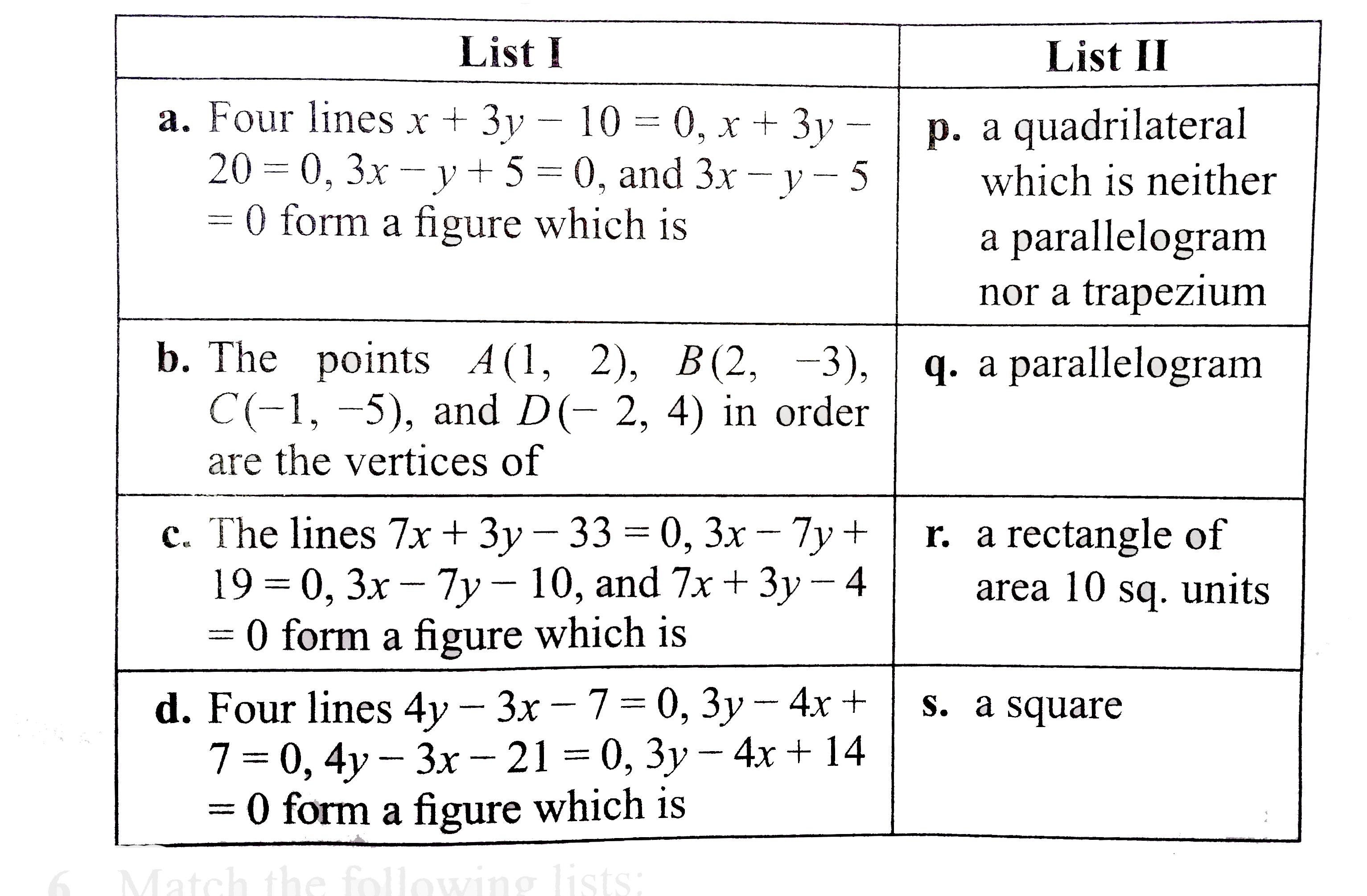Let L be the line belonging to the family of straight lines (a+2b) x+(a-3b)y+a-8b =0, a, b R, which is the farthest from the point (2, 2).
The equation of line L isSolution in Bengali
4/3 sq. units
9/2 sq. units
49/8 sq. units
none of these
The correct Answer is:C
Also, this line x+4y+7 =0 meets the axes C(-7,0) and D(0, -7/4). Then the area of triangle OCD is (1/2)|(-7)(-7/4)| or 49/8.
Topper's Solved these Questions
- STRAIGHT LINESBOOK - CENGAGE PUBLICATIONCHAPTER - STRAIGHT LINESEXERCISE - EXERCISE (MATRIX MATCH TYPE)
8 Videos
- STRAIGHT LINESBOOK - CENGAGE PUBLICATIONCHAPTER - STRAIGHT LINESEXERCISE - EXERCISE (NUMERICAL VALUE TYPE)
13 Videos
- STRAIGHT LINESBOOK - CENGAGE PUBLICATIONCHAPTER - STRAIGHT LINESEXERCISE - EXERCISE (MULTIPLE CORRECT ANSWERS TYPE)
30 Videos
- STRAIGHT LINEBOOK - CENGAGE PUBLICATIONCHAPTER - STRAIGHT LINEEXERCISE - Multiple Correct Answers Type
8 Videos
- THEORY OF EQUATIONSBOOK - CENGAGE PUBLICATIONCHAPTER - THEORY OF EQUATIONSEXERCISE - JEE ADVANCED (Numerical Value Type )
1 Videos
Similar Questions
Match the following lists:

View SolutionFind the number of permutations of the set {1,2,3,4} in which no two adjacent positions are filled by consecutive integers ( increasing orders).
View SolutionIf P is a point (x,y) on the line y=−3x such that P and the point (3, 4) are on the opposite sides of the line 3x−4y=8, then x>815 (b) x>85 y<−85 (d) y<−815
View SolutionThe point P(α,α+1) will lie inside the triangle whose vertices are A(0,3),B(−2,0) and C(6,1) if
View SolutionThe number of distinct real roots of x4−4x3+12x2+x−1=0is_____.
View SolutionConsider a family of straight lines (x+y)+λ(2x−y+1)=0 . Find the equation of the straight line belonging to this family that is farthest from (1,−3).
View SolutionLet l be the line belonging to the family of straight lines (a+2b)x+(a-3b)y+a-8b=0,a,b in R which is farthest from the point (2,2,2, then area enclosed by the line L and the coordinate axes is
View SolutionLet L be the line belonging to the family of straight lines (a+2b) x+(a-3b)y+a-8b =0, a, b ∈R, which is the farthest from the point (2, 2).
If L is concurrent with the lines x-2y+1=0 and 3x−4y+λ=0, then the value of λ is
View SolutionLet 2a+2b+c=0 , then the equation of the straight line ax + by + c = 0 which is farthest the point (1,1) is
View Solutionमाना रेखा L, रेखाओं के कुल (a + 2b)x + (a -3b)y + a -8b=0, a,b∈R, में बिन्दु (2, 2) से दूरस्थ स्थित है।
रेखा L का समीकरण है
View Solutionमाना रेखा L, रेखाओं के कुल (a + 2b)x + (a -3b)y + a -8b=0, a,b∈R, में बिन्दु (2, 2) से दूरस्थ स्थित है।
रेखा L का समीकरण है
View SolutionLet l be the line belonging to the family of straight lines (a+2b)x+(a−3b)y+a−8b=0,a,b∈R, which is farthest from the point (2,2), then area enclosed by the line L and the coordinate axes is
View SolutionLet l be the line belonging to the family of straight lines (a+2b)x+(a−3b)y+a−8b=0,a,b∈R, which is farthest from the point (2,2), then area enclosed by the line L and the coordinate axes is
View SolutionLet L be the line belonging to the family of straight lines (a+2b) x+(a-3b)y+a-8b =0, a, b ∈R, which is the farthest from the point (2, 2).
If L is concurrent with the lines x-2y+1=0 and 3x−4y+λ=0, then the value of λ is
View SolutionIf a family of straight line (x+y)+λ(2x−y+1)=0. Find the equation of the staright line belonging to this family that is farthest from (1,-3).
View SolutionLet L be the line belonging to the family of straight lines (a+2b)x+(a−3b)y+a−8b=0a,b∈R, which is the farthest from the point (2,2)
The equation of line L is
View Solution
